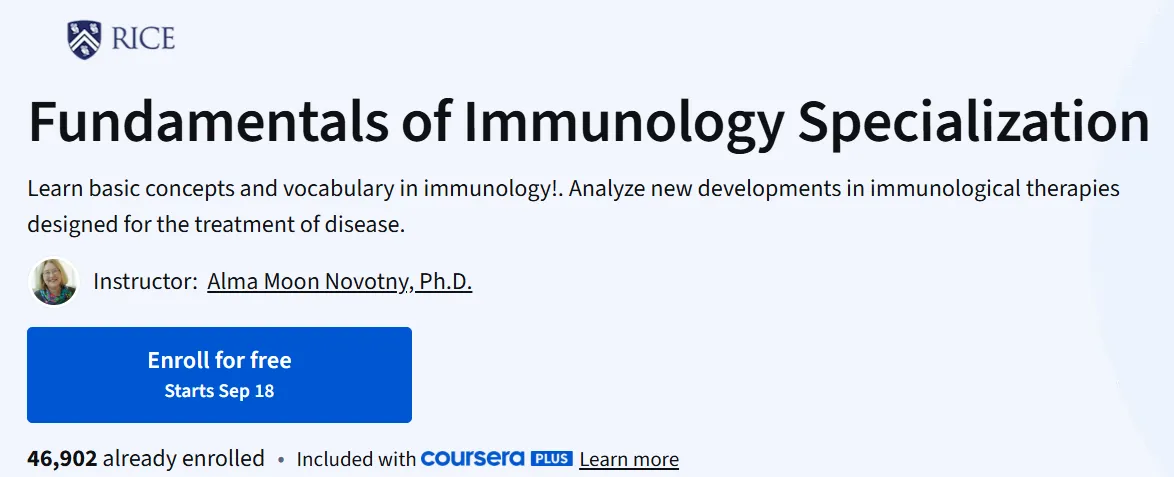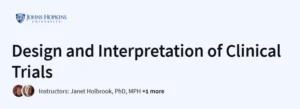What will you learn in Fundamentals of Immunology Specialization Course
Understand the fundamentals of immunology, including innate and adaptive immunity.
Learn how B cells, T cells, and antibodies function in defending against pathogens.
Explore antigen presentation, immune cell signaling, and the role of cytokines.
Study how the immune system distinguishes self from non-self and prevents autoimmunity.
Analyze immune dysfunction, hypersensitivities, allergies, and autoimmune disorders.
Gain insight into immunological memory, vaccines, and modern immunotherapies.
Program Overview
Fundamentals of Immunology: Innate Immunity and B-Cell Function
⏳ ~20 hours
Introduction to immune system structure and function.
Explore innate immune defenses, barriers, and inflammatory response.
Learn B-cell development, antibody generation, and antigen recognition.
Fundamentals of Immunology: T Cells and Signaling
⏳ ~18 hours
Study T-cell receptors, activation, and differentiation.
Understand antigen presentation via MHC molecules.
Explore signaling pathways in immune responses and pathogen elimination.
Fundamentals of Immunology: Death by Friendly Fire
⏳ ~20 hours
Learn mechanisms of immune tolerance and regulation.
Study autoimmune diseases, hypersensitivity reactions, and immunodeficiency.
Explore allergies, graft rejection, and overactive immune responses.
Immunology Capstone Project
⏳ ~15–18 hours
Apply acquired immunology knowledge to solve clinical case studies.
Develop analyses of immune-related diseases.
Present findings on therapies, vaccines, or experimental treatments.
Get certificate
Job Outlook
Strong demand for immunology expertise in medicine, research, biotechnology, and pharmaceuticals.
Immunologists and clinical researchers play key roles in vaccine development, cancer immunotherapy, and infectious disease control.
Entry-level research roles earn $60K–$80K, with senior scientists and medical immunologists exceeding $100K–$150K.
Employers seek candidates skilled in immunology, molecular biology, and clinical applications.
The specialization supports careers in medicine, biomedical sciences, immunotherapy, and academic research.
Specification: Fundamentals of Immunology Specialization
|
FAQs
- A basic understanding of high school biology is helpful.
- No medical or advanced degree is required.
- Core immunology terms are introduced gradually.
- Visuals and examples make complex concepts easier.
- Curiosity about science and health is the most important.
- Helps in understanding vaccines and public health.
- Useful for careers in biotechnology and pharmaceuticals.
- Supports roles in science communication and education.
- Improves knowledge for nutrition, wellness, and healthcare fields.
- Builds scientific literacy for informed decision-making.
- Yes, immune response to viruses and pathogens is discussed.
- Explains how vaccines and immunity are developed.
- Case studies may reference COVID-19 or similar outbreaks.
- Provides a framework to understand new health challenges.
- Builds awareness of how immunity evolves with global diseases.
- Provides strong fundamentals for advanced biology or medical studies.
- Introduces key lab concepts useful in immunology research.
- Enhances applications for graduate or medical school.
- Adds credibility in scientific CVs and scholarship applications.
- Equips learners with vocabulary needed for scientific literature.
- Read science journals like Nature Immunology or The Journal of Immunology.
- Follow reputable health organizations for updates.
- Use flashcards to memorize immune system terms.
- Join forums or study groups for peer discussions.
- Apply knowledge to real-world contexts like vaccines or allergies.





